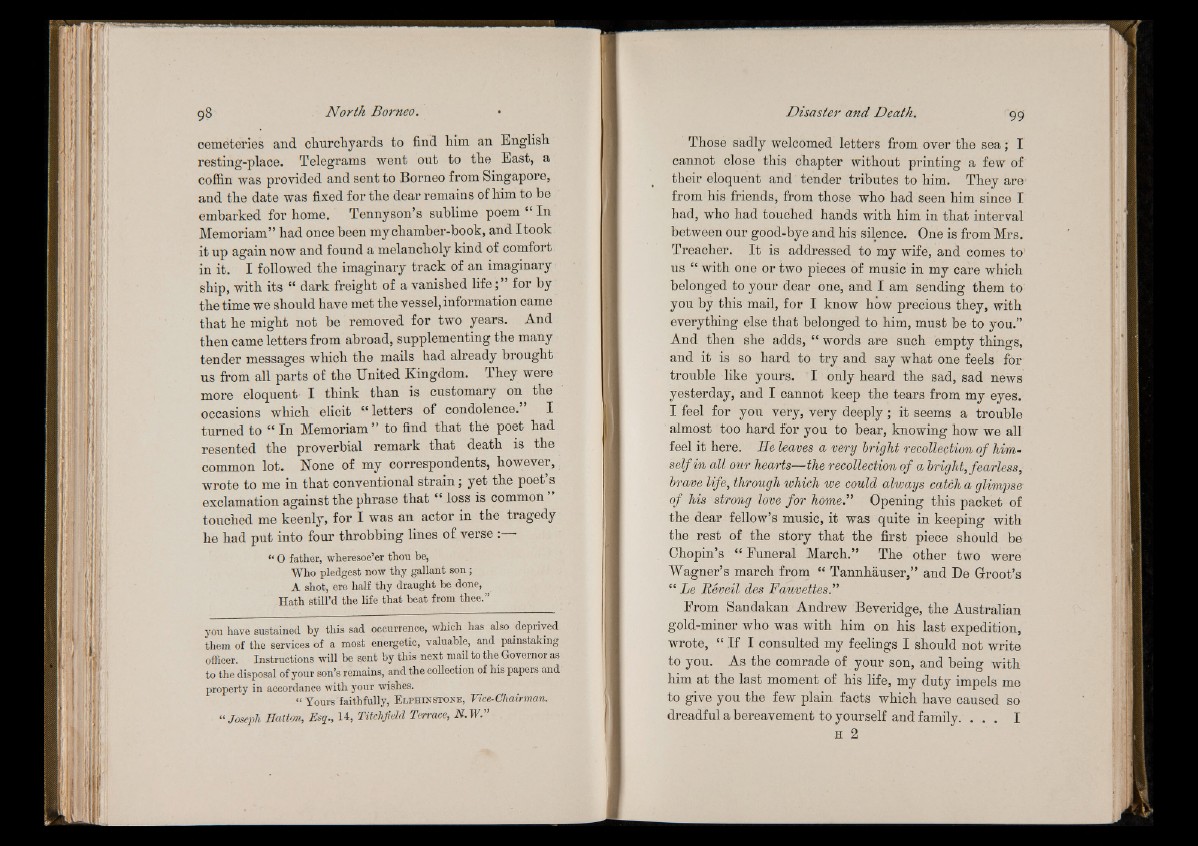
cemeteries and churchyards to find him an English
resting-place. Telegrams went out to the East, a
coffin was provided and sent to Borneo from Singapore,
and the date was fixed for the dear remains of him to be
embarked for home. Tennyson’s sublime poem In
Memoriam” had once been my chamber-book, and Itook
it up again now and found a melancholy kind of comfort
in it. I followed the imaginary track of an imaginary
ship, with its “ dark freight of a vanished l i f e f o r by
the time we should have met the vessel, information came
that he might not be removed for two years. And
then came letters from abroad, supplementing the many
tender messages which the mails had already brought
us from all parts of the United Kingdom. They were
more eloquent I think than is customary on the
occasions which elicit “ letters of condolence. I
turned to “ In Memoriam” to find that the poet had
resented the proverbial remark that death is the
common lot. None of my correspondents, however,
wrote to me in that conventional stra in ; yet the poet’s
exclamation against the phrase that “ loss is common
touched me keenly, for I was an actor in the tragedy
he had put into four throbbing lines of verse
“ 0 father, wheresoe’er thou he,
Who pledgest now thy gallant son;
A shot, ere half thy draught he done,
Hath still’d the life that heat from thee.”
you have sustained by this sad occurrence, which has also deprived
them of the services of a most energetic, valuable, and painstaking
officer. Instructions will he sent by this next mail to the Governor as
to the disposal of your son’s remains, and the collection of his papers and
property in accordance with your wishes.
“ Y o u r s faithfully, E l p h in s t o n e , Vice-Chairman.
“ Joseph Hatton, Esq., 14, Titchfield Terrace, N.W."
Those sadly welcomed letters from over the sea ; I
cannot close this chapter without printing a few of
their eloquent and tender tributes to him. They are
from his friends, from those who had seen him since I
had, who had touched hands with him in that interval
between our good-bye and his silence. One is from Mrs.
Treacher. I t is addressed to my wife, and comes to'
us “ with one or two pieces of music in my care which
belonged to your dear one, and I am sending them to
you by this mail, for I know how precious they, with
everything else that belonged to him, must be to you.”
And then she adds, “ words are such empty things,
and it is so hard to try and say what one feels for
trouble like yours. I only heard the sad, sad news
yesterday, and I cannot keep the tears from my eyes.
I feel for you very, very deeply ; it seems a trouble
almost too hard for you to bear, knowing how we all
feel it here. He leaves a very bright recollection of himself
in all our hearts—the recollection of a bright, fearless,
brave life, through which we could always catch a glimpse-
of his strong love for home.” Opening this packet of
the dear fellow’s music, it was quite in keeping with
the rest of the story that the first piece should be
Chopin’s “ Funeral March.” The other two were
Wagner’s march from “ Tannhäuser,” and De Groot’s
“ Le Réveil des Fauvettes.”
From Sandakan Andrew Beveridge, the Australian
gold-miner who was with him on his last expedition,
wrote, “ I f I consulted my feelings I should not write
to you. As the comrade of your son, and being with
him at the last moment of his life, my duty impels me
to give you the few plain facts which have caused so
dreadful a bereavement to yourself and family. . . . I
h 2